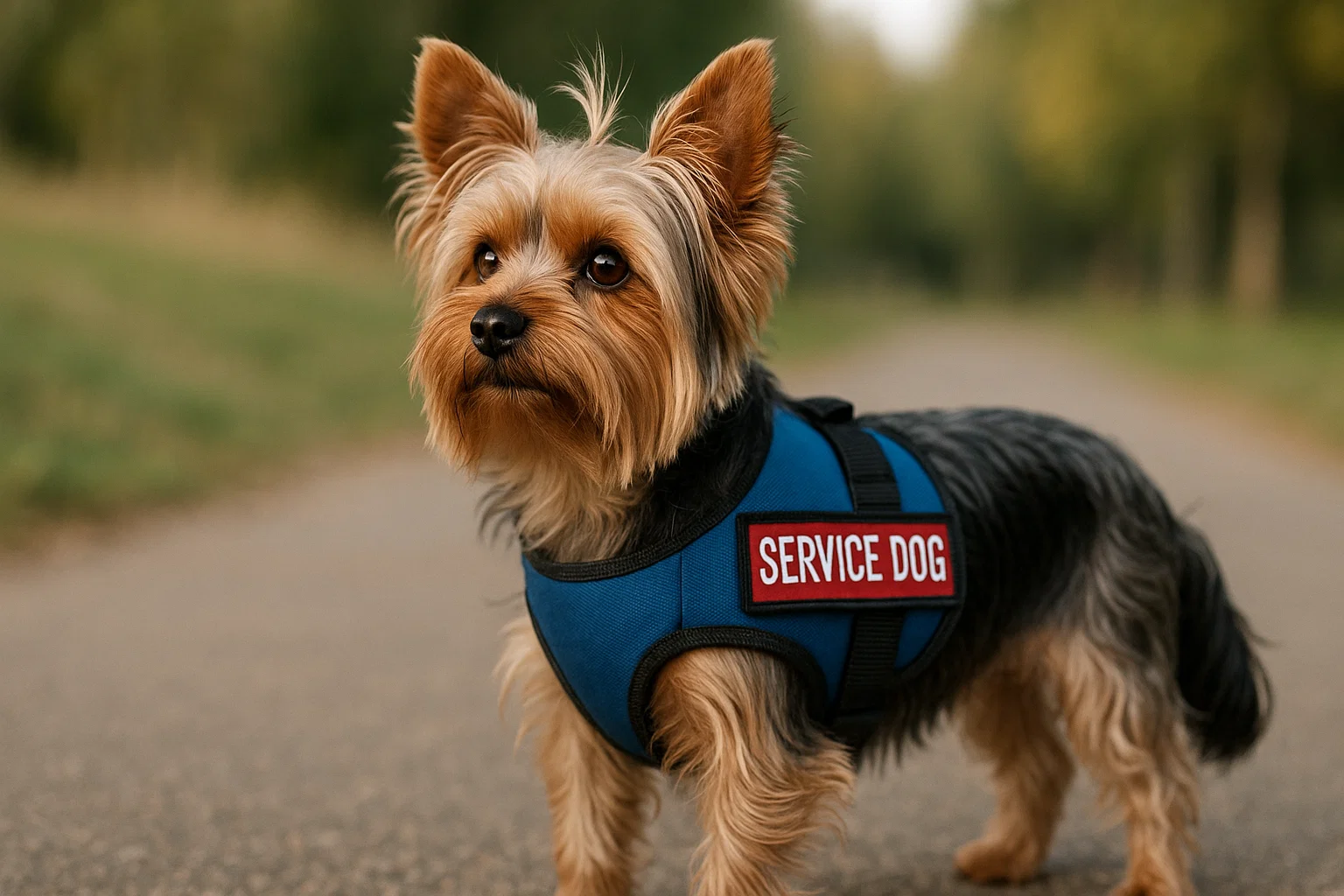Yorkshire Terrier as a Service Dog
Get Your Documents

Yorkshire Terrier Overview
The Yorkshire Terrier, affectionately known as the “Yorkie,” is a small but spirited breed, popular around the world for their energetic personality and charming appearance. Originating in England during the 19th century, these terriers were initially bred to catch rats in clothing mills. Today, they are primarily cherished as companion animals. However, their intelligence and lively temperament can also lend themselves to various roles, including that of a service dog under specific conditions.
Physical Characteristics
Yorkshire Terriers are one of the smallest dog breeds, weighing between 4 to 7 pounds and standing about 7 to 8 inches tall at the shoulder. Their most distinguishable feature is their silky, blue-and-tan coat, which requires regular grooming to maintain its health and appearance. Despite their petite size, Yorkies possess a sturdy frame and carry themselves with an air of confidence.
The Yorkie’s small stature can be both an advantage and a disadvantage when it comes to service work. On one hand, their compact size means they can easily accompany their handlers in various environments, including tight or crowded spaces such as public transportation or small offices. On the other hand, their small size limits them from performing tasks that require strength or pulling power, such as mobility assistance.
Yorkies generally have a moderate amount of energy and enjoy daily walks and playtime. Their exercise needs are lower compared to larger breeds, which can be beneficial for handlers who are unable to provide intensive physical exercise. However, they do require mental stimulation to keep their intelligent minds engaged, making puzzle toys and training sessions excellent activities for them.
Temperament and Attitude
Yorkshire Terriers are renowned for their bold personalities and lively attitudes. Although small, they often exhibit a larger-than-life demeanor, displaying traits typically associated with much bigger breeds. This can include a certain level of stubbornness or independence — traits that can impact their suitability for certain types of service work.
Their keen intelligence makes them quickly learn new commands and tricks, but it also means they can easily become bored with repetitive tasks. Therefore, training sessions must remain varied and engaging to keep their attention. Yorkies are also known for their keen sense of hearing and alert nature, which can make them excellent candidates for alert-based service roles.
In public or stressful environments, their assertiveness serves them well, as they are less likely to be intimidated by the hustle and bustle. Nonetheless, they must be properly socialized to ensure they do not develop fear-based aggression, which can be a concern given their natural tendency to be protective of their territory and loved ones.
Types of Service Work
While Yorkshire Terriers may not fit the traditional mold of a service dog due to their size, they can still excel in certain roles, especially those requiring alertness and companionship.
- Hearing Assistance: Yorkies’ sharp ears make them well-suited for hearing assistance roles, where they can alert their hearing-impaired handlers to important sounds like doorbells, alarms, or crying babies.
- Medical Alert: Their attentive nature enables them to be trained to recognize physiological changes in their handlers, such as those associated with impending seizures or low blood sugar levels in diabetics.
- Psychiatric Support and Emotional Comfort: Due to their nurturing companionship and zestful temperament, Yorkies often excel as psychiatric service dogs or emotional support animals, providing comfort and companionship to individuals suffering from mental health conditions like anxiety or PTSD.
The limitations of the Yorkie in service dog work center largely around physical capabilities. They are not suitable for tasks requiring significant physical intervention, such as physical mobility assistance or guiding individuals as a seeing-eye dog.
Health Considerations
Like all breeds, Yorkshire Terriers have specific health concerns that may impact their ability to perform reliably in service dog roles. A major consideration includes their susceptibility to dental issues due to their small mouths, so regular dental care is crucial.
Other potential health issues in Yorkies include patellar luxation, hypoglycemia in puppies, and eye problems. Additionally, their delicate size means they can be prone to injuries if not handled correctly. It’s imperative that owners maintain regular veterinary appointments to monitor these conditions which could undermine their ability to function effectively as service dogs.
Training and Suitability
The trainability of Yorkshire Terriers varies with their temperament and intelligence. Their alert nature and desire to please their owners can make them quick learners when it comes to commands and tricks. However, as mentioned earlier, their independent streak may require a patient and possibly more creative approach to traditional training methods.
Training for service roles should start early in the Yorkie’s life to ensure they develop the necessary skills and behaviors effectively. Positive reinforcement methods and consistency are key to overcoming their occasional stubbornness. Their intelligence, which can make them quite adept at learning intricate tasks, coupled with their strong bond with their handlers, makes them suitable for high-attention roles like medical alert.
Because of their size, it’s crucial that Yorkies in public roles are well-socialized and desensitized to a variety of environments, ensuring they remain calm and focused amidst potential distractions.
Summary of Yorkshire Terrier
In summary, the Yorkshire Terrier’s potential as a service dog, while not fitting the conventional criteria due to their size, is nonetheless significant in specific roles. Here are the key strengths, weaknesses, and ideal service roles:
Strengths:
- Loyalty and strong bond with handlers
- High intelligence and learning capacity
- Quick reflexes and alert nature
- Suitable for compact environments
Weaknesses:
- Limited physical strength; unsuitable for physical assistance roles
- Prone to specific breed-related health issues
- Independent and may require varied training methods
Ideal Service Roles:
- Hearing Assistance
- Medical Alert
- Psychiatric Support and Emotional Comfort
Get Your Documents
Example State Cards













